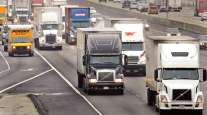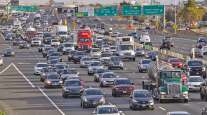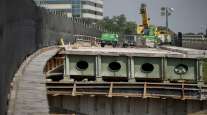Senior Reporter
ATA President Chris Spear Presses Congress on Infrastructure Funding, Autonomous Tech
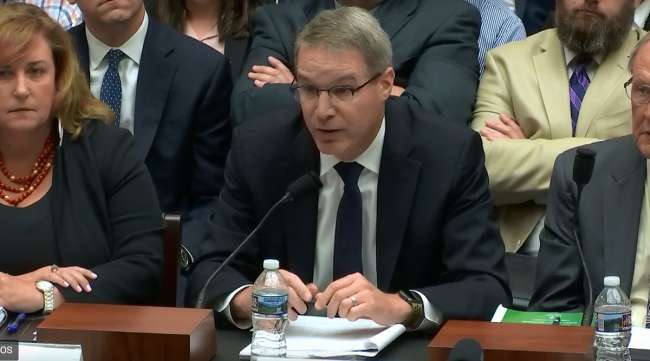
[Stay on top of transportation news: Get TTNews in your inbox.]
WASHINGTON — Allowing segments of the country’s surface transportation system to deteriorate hinders economic growth and contributes to a significant number of road accidents, American Trucking Associations President Chris Spear told a congressional panel June 12.
Spear called on the Highways and Transit Subcommittee to adopt a sustainable funding plan for the country’s infrastructure system, noting a report linking an underinvestment in highway safety programs to more than half of highway fatalities.
“Quite frankly, the federal government is not investing in infrastructure. There’s less room. There’s a lot more accidents out there happening because of the result of the lack of infrastructure investment in this country. And we’re still out there moving freight,” Spear said. “We have to find a way to be safer given the current decaying infrastructure that we’re being dealt.”
In prepared remarks, Spear emphasized the federal government must retain its role as the overseer of sound interstate commerce and noted a study by the American Transportation Research Institute that determined in 2016, congestion led to an annual cost to the trucking industry of nearly $75 billion. Congestion is among the factors that “serve as a brake on economic growth and job creation nationwide,” Spear explained.
First of all, it ain't happening. We're not going driverless tomorrow, not five, not probably in 50 years out. It'll come some day. You're going to have drivers in trucks for a long time.
Chris Spear, ATA president and CEO
To assist Congress in securing long-term funding for infrastructure projects, ATA recently proposed the Build America Fund. This proposal calls for the adoption of a 20-cents-per-gallon fee on motor fuels, which would be collected at the wholesale rack and phased in over four years at 5 cents per year. According to ATA, if enacted, the fund would generate about $340 billion in about a decade.
Transportation leaders on Capitol Hill also continue to review the potential safety benefits from autonomous technology. Collision avoidance systems are gaining acceptance industrywide, and Spear touted such technological advancements. He stressed, however, the role of drivers would remain central to the movement of heavy trucks across the freight industry in the foreseeable future.
“First of all, it ain’t happening. We’re not going driverless tomorrow, not five, not probably in 50 years out. It’ll come some day,” Spear said, adding, “You’re going to have drivers in trucks for a long time.”
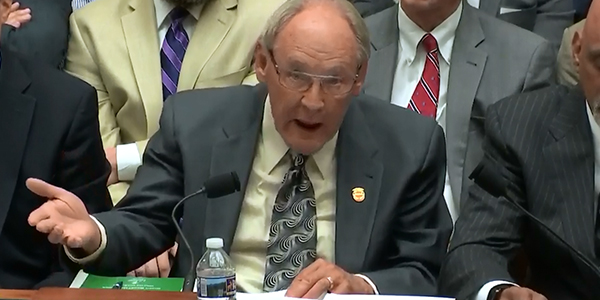
Owner-Operator Independent Drivers Association President Todd Spencer says if Congress is serious about improving trucking in America, it must start by making careers in the industry more attractive. (House Transportation & Infrastructure Committee via YouTube)
Technology firms and certain automakers are testing autonomous trucks as they ready their introduction into the marketplace. Congress, however, has yet to send to the president’s desk comprehensive autonomous vehicles legislation.
And, similar to policy on autonomous trucks and cars, congressional leaders have not taken up comprehensive infrastructure funding policy this year despite having pledged to do so. A high-profile meeting in May between President Donald Trump and Speaker Nancy Pelosi to outline a road map for a $2 trillion infrastructure plan ended abruptly.
Meanwhile, funding authority for an account that assists states with maintenance and construction of highway projects expires in the fall of 2020.
Also at the hearing was Owner-Operator Independent Drivers Association President Todd Spencer, who took issue with industry findings regarding a shortage of truck drivers. As he put it, “If Congress is serious about improving the state of trucking in America, and I believe you are, you must start by helping to make careers in trucking more viable … Steps must be taken to improve working conditions and ensure drivers are fairly compensated.”
Other panelists urged policymakers to require side underride guards on trucks.
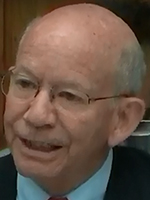
DeFazio
Lawmakers agreed to continue to promote safety throughout the trucking industry, as well as other modes of transportation.
“Let’s figure out how Congress and the administration can maintain the highest levels of safety with clear, enforceable regulations, but in a way that acknowledges the diversity of operations and the rapidly changing nature of the industry,” said Transportation panel Chairman Peter DeFazio (D-Ore.).
Rep. Rodney Davis (R-Ill.), the top Republican on the Highways and Transit panel, echoed DeFazio’s safety sentiment and touted private firms.
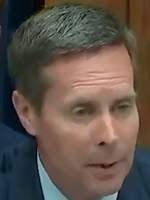
Davis
“Congress, along with the [U.S.] Department of Transportation, our nonfederal partners and the private sector, has made strides to improve the safety of our surface transportation system. But there is always more that we can do together,” Davis said. “We need to focus federal resources where they can make the most impact and continue to provide state law enforcement agencies with the tools and resources they need to effectively enforce federal regulations.”
During the hearing, Rep. Doug LaMalfa (R-Calif.) promoted his Modern, Clean, and Safe Trucks Act of 2019, a bill that would repeal the 12% federal excise tax on certain heavy-duty trucks, tractors and trailers.


